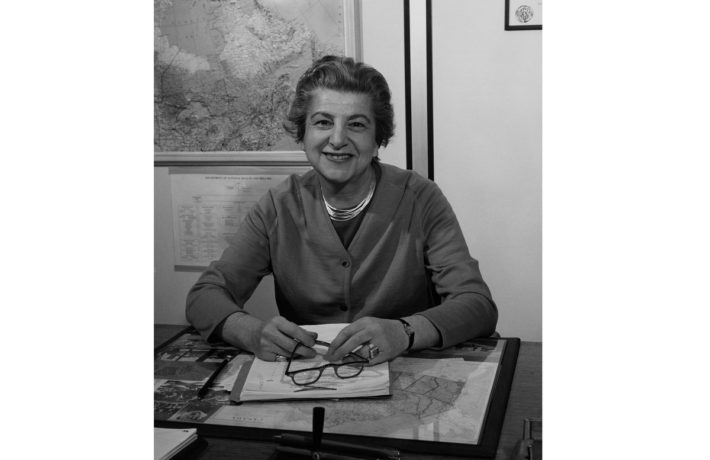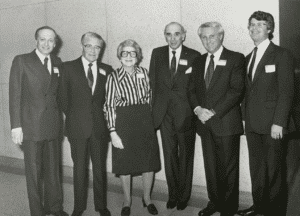
1910 – December 9, 2003
Sylva Gelber was the second of five children born into a prominent Jewish family in Toronto, Ont. Her parents, Louis and Sara Gelber, raised their daughter and sons, Lionel, Marvin, Arthur and Michael, in a home steeped in music and the arts.
After brief stints at the University of Toronto and Columbia University in New York City, 21-year-old Gelber returned to Toronto, where she produced, directed and acted in The Dybbuk at Hart House Theatre. The effort received such critical acclaim that her parents readily assented to her spending a year in Palestine rather than risk her succumbing to the allure of theatre.
In the fall of 1932, Gelber set out for Palestine, where one year stretched into 15 years, filled with challenges and experiences beyond any she would have had in Canada. Gelber recorded her retrospective of that unique time in her book No Balm in Gilead, published in 1989.
Gelber was among the first graduates of the school of social work established by Henrietta Szold in Jerusalem. After graduation, Gelber pioneered as a family counsellor and probation officer with the Va’ad Le’umi Social Work Bureau (1932–1937) and as a medical social worker with the Hadassah Medical Organization (1937–1942). From 1942 to 1948 she worked for the (British) Government of Palestine Department of Labour.
In 1949, Gelber returned to Canada and began her career with the federal public service. From 1950 to 1968, she worked as a health insurance consultant for the Department of National Health and Welfare, where she played a major role in the creation of Canadian universal health insurance. From 1968 to 1975, Gelber served as director of the Women’s Bureau of the Canada Department of Labour, where she blazed a trail for women to follow in high-level government positions, and from 1970 to 1974, she was the Canadian representative to the UN Commission on the Status of Women. In these positions, Gelber gained national prominence as an outspoken advocate of women’s rights who helped introduce equal-pay legislation, maternity leave and women’s pension benefits into Canadian society. For her efforts, she received the Order of Canada in 1975.
Concurrent to these roles, she served as special adviser to the Canadian UN General Assembly delegation and as Canadian delegate to International Labour Organization conferences. In 1978, Gelber took on the responsibilities of vice-president of the Canadian Human Rights Foundation.
Music remained one of the great loves of Gelber’s long and productive life. In 1980, after retiring as special adviser to the deputy minister of labour, she translated that ardour into support for the encouragement of young talent in both Canada and Israel. She established the Sylva Gelber Music Foundation, designed to financially assist promising young Canadian classical musicians through an award administered by the Canada Council, and soon afterward endowed a prize for students at the Rubin Academy of Music and Dance in Jerusalem through the Canada-Israel Cultural Foundation.
Images-
Featured Photo: Sylva Gelber, Government of Canada, 1967, Library and Archives Canada, R5048
Group Photo: Group at the UJA Public Service Dinner, 1982. Ottawa Jewish Archives. O0041. Ottawa Jewish Bulletin fonds, (15-047-02).